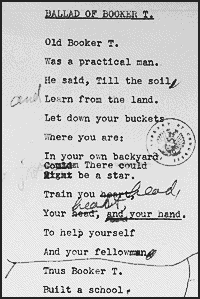The Manuscript Division possesses one of the nation's most valuable collections for the study of African-American history and culture. Extensive documentation exists for researching slavery and African-American life in the eighteenth and nineteenth centuries and for studying the civil rights movement in the twentieth century. The manuscripts of black and white abolitionists such as Frederick Douglass and Salmon P. Chase describe the efforts of those who attempted to alleviate the plight of slaves, and the records of the American Colonization Society detail the saga of African Americans who left the United States and established the West African nation of Liberia in the mid-nineteenth century. Papers relating to black participation and victimization in the Civil War abound, and African-American history during Reconstruction is reflected in collections pertaining to newly elected black officials such as John Mercer Langston, Blanche K. Bruce, Hiram R. Revels, and Francis L. Cardozo.

Efforts by African Americans to educate themselves and find meaningful employment can be traced in the papers of historian Carter G. Woodson, lawyer and judge Robert H. Terrell, and educators Mary Church Terrell and Nannie Helen Burroughs. Also available are the papers of the first three presidents of Tuskegee Institute-- Booker T. Washington, Robert Russa Moton, and Frederick D. Patterson. Information on the training of black aviators and the establishment of the Tuskegee flight school may be found in the diaries of historian Rayford W. Logan and the papers of Gen. Noel F. Parrish, the white World War II commander of the Tuskegee air base where black airmen were trained by the army air corps for the first time.
The division's collections are particularly strong for the history of the twentieth-century civil rights movement. The work of individual activists, rights organizations, and jurists is well represented. The National Association for the Advancement of Colored People (NAACP) and the National Urban League (NUL) were founded in the first decade of the twentieth century and became important vehicles for the advancement of civil rights for blacks in the United States. Both, in turn, selected the Library of Congress as the repository for their records, which document the battle for equal employment opportunities for blacks, the drive for equal legal protection, and the struggle against segregation, discrimination, lynching, and other forms of racial oppression.
In addition to these organizational records, the division holds the personal papers of some of the individuals who worked closely with the NAACP such as Moorfield Storey, the association's first president; Arthur B. Spingarn, its third president; and Roy Wilkins, longtime administrator and executive director from 1965 to 1977. The division also holds the records of the NAACP Legal Defense and Educational Fund (LDF), which was created by the NAACP just before World War II but eventually became independent of the parent organization. The fund's records document its presence at the forefront of the legal struggle for civil rights. Complementing these records are the personal papers of Justice Thurgood Marshall, who was the special counsel and director of the LDF from its creation until 1961 when President John F. Kennedy appointed him to the United States Court of Appeals for the Second Circuit. Many of the legal challenges brought by the NAACP and the LDF were decided by Supreme Court justices (Hugo L. Black, William J. Brennan, Harold H. Burton, William O. Douglass, Felix Frankfurter, Arthur J. Goldberg, Robert H. Jackson, Earl Warren, and Byron White) and lower court judges (Clement F. Haynsworth, Frank Minis Johnson, and J. Skelly Wright) whose papers the division holds.
Other important civil rights activists and organizations represented in the Manuscript Division include the Brotherhood of Sleeping Car Porters, Asa Philip Randolph, Bayard T. Rustin, Rayford W. Logan, Lorenzo J. Greene, Kenneth Bancroft Clark, Joseph L. Rauh, and Harold C. Fleming.
The papers of Patricia Roberts Harris, Edward W. Brooke, and Hugh H. and Mabel M. Smythe also illustrate the efforts of African Americans to move into the center of the political arena. Harris, the first black woman to hold a Cabinet position, served as secretary of housing and urban development and secretary of health, education, and welfare (later called health and human services) under President Jimmy Carter. Brooke was the third black United States senator in the nation's history and the only one elected in this century until Carol Moseley Braun's recent victory. The Smythes were two of the first African Americans to break the racial barrier in the State Department's diplomatic corps.
The division's African-American manuscript collections have served historians well, supporting the much-increased scholarship in black history that began in the 1960s. The NAACP records are annually the most heavily used collection in the division, and other black history collections attract large numbers of scholars, testifying to their importance not only to the Library but to the nation itself.
Selected items relating to:African-American History and Culture
am Sept-8-97